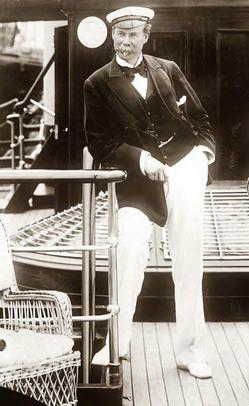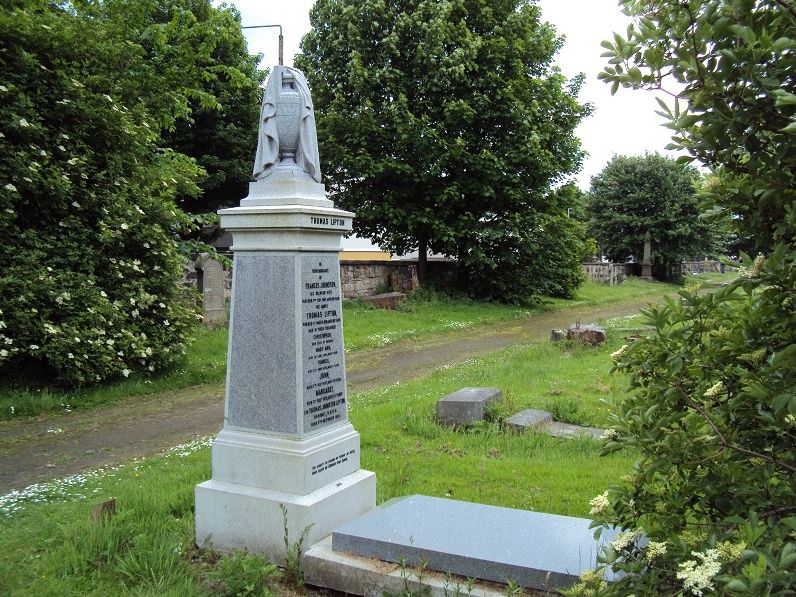Thomas Lipton

As far as the SFHG understands Thomas Johnstone Lipton, 1st Baronet, never played football, although born in 1848 and thus only in his mid-twenties when the explosion of the game began in Scotland. At six feet one inch he might have made a good centre-back had they existed at the time. But he clearly knew the game and had affinity, a soft spot, becoming later in life first the sponsor at the international level in South America of the Copa Lipton, a fore-runner of the Copa America, and then at club level of a competition, the Lipton Trophy, a prototype for the European Cup and therefore today's Champions League.
Tommy Lipton was born of Protestant Irish parents in 1850, perhaps 1848, in The Gorbals. His father was a Watchman in Barony, then a Carter and finally back south of the river a Butter and Eggs Merchant, precisely what his son would initially become, albeit after a short interlude. His father had been able to open on Crown St., Thomas had found work as a message boy but clearly had other plans so much so that in 1864 the young man took himself off to America for a wee while. But he returned by 1871 and with some money, with which he went into business alongside his old man, that same year opening a shop in Anderston and from when on business boomed. The family was then able by 1881 to take itself to live in Cambuslang, in their Johnstone Villa, he and his father now both calling themselves Provisions Merchants, i.e. Grocers, and by the time of his mother's death in 1889 and his father's the following year the empire had grown to three hundred sites.
By that same time Lipton had successfully expanded and was expanding his interests with investments abroad. In the 1880s it was in meat in the United States and in the 1890s in tea in Ceylon, the foundation of the Lipton's Tea brand of today. And after his parents death he also moved South, first to London's Muswell Hill and then in 1892 to Osidge House between Southgate and Barnet, where he was to stay for the rest of his life.
And it was about this same time that his interest in sports began to grow. First came yachting, he first challenging for the America Cup in 1899, the first of five attempts to 1930, all unsuccessful. Then he turned to football in 1905 donating the Copa Lipton to be competed between the national teams of Argentina and Uruguay. And to Buenos Aires, where the leading light in football was Alex Watson Hutton, born in The Gorbals five year Lipton's junior, his father also a grocer, it was carried by Arnot Leslie, who a decade and a half earlier had been instrumental in the foundation of the first Argentine Football Association (AFA), had managed Lomas, the dominant team in the second AFA, whose brothers, George and William, had played for Argentina in the first and second international matches and whose father, again Arnot, had also been born in The Gorbals eight years his senior. It seems unlikely to a have been coincidence.
And from a first taste effectively of football sponsorship Lipton was to go on to in 1909 and 1911 to provide the cup for a competition staged in Italy with the support of its royal family and which included clubs from the north of the home nation, Switzerland, Germany and England. There was no Scottish team but it was a start and, for Italian geographical balance, was contemporaneous with the Lipton Challenge Cup, played between the champion teams of Southern Italy and Sicily.

Sir Thomas Lipton never wed. He was gay. There is some confusion with another Thomas Lipton, also a Scot of the time, who did marry and have a family but it was a Catholic wedding.
And on death he was an immensely wealthy man. With his passing he left £566,000, the equivalent of £44 million now, bequeathing the bulk of it to his native city, Glasgow. And it is there that he chose to be buried in the Southern Necropolis less than a mile from where he was born and with his mother, father and his siblings, he being the only one of three to survive beyond their teens.
Birth Locator:
1848 - Crown St., Hutchesontown, Glasgow
Residence Locations:
1851 - Barony, Glasgow
1861 - 13, Crown St., Hutchesontown, Glasgow
1864 - to USA
1871 - 13, Crown St., Hutchesontown, Glasgow
1881-91 - Johnstone Villa, North Ave., Cambuslang, Glasgow
1901-31 - Osidge, 151-153, Chase Side, Southgate, Middx.
Death Locator:
1931 - Osidge, 151-153, Chase Side, Southgate, Middx.
Grave Locator:
Back to the Glasgow Southside Trail
or the SFHG Home